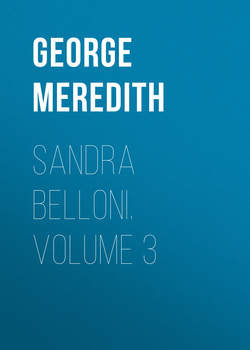Читать книгу Sandra Belloni. Volume 3 - George Meredith - Страница 3
CHAPTER XX
ОглавлениеA half-circle of high-banked greensward, studded with old park-trees, hung round the roar of the water; distant enough from the white-twisting fall to be mirrored on a smooth-heaved surface, while its out-pushing brushwood below drooped under burdens of drowned reed-flags that caught the foam. Keen scent of hay, crossing the dark air, met Emilia as she entered the river-meadow. A little more, and she saw the white weir- piles shining, and the grey roller just beginning to glisten to the moon. Eastward on her left, behind a cedar, the moon had cast off a thick cloud, and shone through the cedar-bars with a yellowish hazy softness, making rosy gold of the first passion of the tide, which, writhing and straining on through many lights, grew wide upon the wonderful velvet darkness underlying the wooded banks. With the full force of a young soul that leaps from beauty seen to unimagined beauty, Emilia stood and watched the picture. Then she sat down, hushed, awaiting her lover.
Wilfrid, as it chanced, was ten minutes late. She did not hear his voice till he had sunk on his knee by her side.
"What a reverie!" he said half jealously. "Isn't it lovely here?"
Emilia pressed his hand, but without turning her face to him, as her habit was. He took it for shyness, and encouraged her with soft exclamations and expansive tenderness.
"I wish I had not come here!" she murmured.
"Tell me why?" He folded his arm about her waist.
"Why did you let me wait?" said she.
Wilfrid drew out his watch; blamed the accident that had detained him, and remarked that there were not many minutes to witness against him.
She appeared to throw off her moodiness. "You are here at last. Let me hold your hand, and think, and be quite silent."
"You shall hold my hand, and think, and be quite silent, my own girl! if you will tell me what's on your mind."
Emilia thought it enough to look in his face, smiling.
"Has any one annoyed you?" he cried out.
"No one."
"Then receive the command of your lord, that you kiss him."
"I will kiss him," said Emilia; and did so.
The salute might have appeased an imperious lord, but was not so satisfactory to an exacting lover. He perceived, however, that, whether as lover or as lord, he must wait for her now, owing to her having waited for him: so, he sat by her, permitting his hand to be softly squeezed, and trying to get at least in the track of her ideas, while her ear was turned to the weir, and her eyes were on the glowing edges of the cedar- tree.
Finally, on one of many deep breaths, she said: "It's over. Why were you late? But, never mind now. Never let it be long again when I am expecting you. It's then I feel so much at his mercy. I mean, if I am where I hear falling water; sometimes thunder."
Wilfrid masked his complete mystification with a caressing smile; not without a growing respect for the only person who could make him experience the pangs of conscious silliness. You see, he was not a coxcomb.
"That German!" Emilia enlightened him.
"Your old music-master?"
"I wish it, I wish it! I should soon be free from him. Don't you know that dreadful man I told you about, who's like a black angel to me, because there is no music like his? and he's a German! I told you how I first dreamed about him, and then regularly every night, after talking with my father about Italy and his black-yellow Tedeschi, this man came over my pillow and made me call him Master, Master. And he is. He seems as if he were the master of my soul, mocking me, making me worship him in spite of my hate. I came here, thinking only of you. I heard the water like a great symphony. I fell into dreaming of my music. That's when I am at his mercy. There's no one like him. I must detest music to get free from him. How can I? He is like the God of music."
Wilfrid now remembered certain of her allusions to this rival, who had hitherto touched him very little. Perhaps it was partly the lovely scene that lifted him to a spiritual jealousy, partly his susceptibility to a sentimental exaggeration, and partly the mysterious new charm in Emilia's manner, that was as a bordering lustre, showing how the full orb was rising behind her.
"His name?" Wilfrid asked for.
Emilia's lips broke to the second letter of the alphabet; but she cut short the word. "Why should you hear it? And now that you are here, you drive him away. And the best is," she laughed, "I am sure you will not remember any of his pieces. I wish I could not—not that it's the memory; but he seems all round me, up in the air, and when the trees move all together…you chase him away, my lover!"
